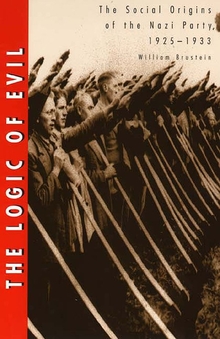The Logic of Evil
WARNING
You are viewing an older version of the Yalebooks website. Please visit out new website with more updated information and a better user experience: https://www.yalebooks.com
The Social Origins of the Nazi Party, 1925-1933
William Brustein
Out of Print
Brustein has carefully analyzed a huge collection of pre-1933 Nazi Party membership data drawn from the official files at the Berlin Document Center. He argues that Nazi followers were more representative of German society as a whole—that they included more workers, more single women, and more Catholics—than most previous scholars have believed. Further, says Brustein, the patterns of membership reveal that people joined the Nazi Party not because of Hitler's irrational appeal or charisma or anti-Semitism, but because the party, through its shrewd and proactive program, offered more benefits to more people than did the other political parties in Weimar Germany. According to Brustein, Nazi supporters were no different from citizens anywhere who select a political party or candidate they believe will promote their economic interests. The roots of evil, he suggests, may be ordinary indeed.
William Brustein is professor and chair of the department of sociology at the University of Minnesota.
"A forceful, cogent, and original explanation for why so many Germans enlisted in the Nazi Party between 1925 and 1933. Brustein not only advances scholarship on the Nazi period but also develops a theory of radical right-wing mobilization that will be useful to other scholars of such movements."—Kathleen M. Blee, University of Kentucky
"The most useful part of this book is the group of chapters in which the author analyzes the material interests of different classes and the responses of the various Weimar parties."—Stanley Hoffmann, Foreign Affairs
"Combining new historical data with acute attention to the problem of individual decisions, Brustein makes frighteningly clear how Nazism could be a reasonable choice for Germans in the 1930s. An important contribution to understanding how radical movements attract followers, and to understanding the rise of the Nazi Party."—Jack A. Goldstone, University of California, Davis
"In this important book, William Brustein uses a powerful analytical theory of modern social science, that of rational choice, to tackle a long-standing puzzle, who joined the Nazi party in Germany in the 1920s and 1930s. Using a large new sample of membership records, Brustein provides compelling evidence that the overriding motivation for membership of the Nazi party was individual economic improvement; individuals believed that party membership would help to insulate them from the rigors of life in Weimar Germany. Such a conclusion is more worrying than previous analyses of Nazism, one of the most significant political mobilizations of this century, since it portends more extremist right-wing movements based on the motivations of individuals to improve their living conditions in times of economic stress. The book deserves a wide readership beyond the specialists of the period and place for this reason."—John O'Loughlin, University of Colorado at Boulder
"His important book should be on the shelves of all academic libraries and all public libraries with a strong Holocaust collection."—Library Journal
"[An] important book on the social origins of the Nazi Party from 1925 to 1933. . . . Its conclusions are significant."—Richard J. Evans, Jewish Chronicle
"This work by William Brustein. . . .represents a major new contribution to the debate about the social profile of the Nazi party before 1933. . . . This innovative study, which will be of interest to both specialists and the general reader, will stimulate further discussion of the 'subjective interests' of Nazi party joiners."—Johnpeter Horst Grill, History
"A fascinating story of how ordinary Germans joined an extraordinary party for ordinary reasons. . . . Brustein has written an important book. The database is impressive, the theory is provocative, and the conclusions are scary. If he is right, and other racist and xenophobic parties can mask their true aims until they attain power, then evil may simply need to craft its message well and rely on our rational instincts for the rest."—Jeffrey Kopstein, American Political Science Review
"The Logic of Evil is destined to become an important contribution to the sociology of Nazism and other extreme political movements. . . . Brustein's important book has brought us a significant step closer to understanding how and why parts of this [Nazi] package became more attractive and acceptable to more people over time."—Helmut K. Anheier, American Journal of Sociology
"An impressive academic analysis of the social origins of the Nazi Party resting on a mountain of research. . . . Those already acquainted with social science research into the origins of the Nazi Party will be impressed with this work. . . . This work will help stimulate a rethinking of contemporary ideas about the rise of the Nazi party. Recommended for advanced students and faculty."—David A. Meier
"A valuable work and will become a standard in its field."—Russel Lemmons, Holocaust and Genocide Studies
"This book is a convincing contribution to the literature; it should not be possible for anyone to discount the economic self-interest factor in future debates."—Gillian Mottram, Faith and Freedom
"An excellent, highly original work."—Stanley Payne, University of Wisconsin, Madison
"A careful analytical study of the question, why so many followed Hitler. The importance of this book is that it is the first thorough examination of the Nazi Party membership file in the Berlin Document Centre."—International Minds
Publication Date: August 28, 1996








